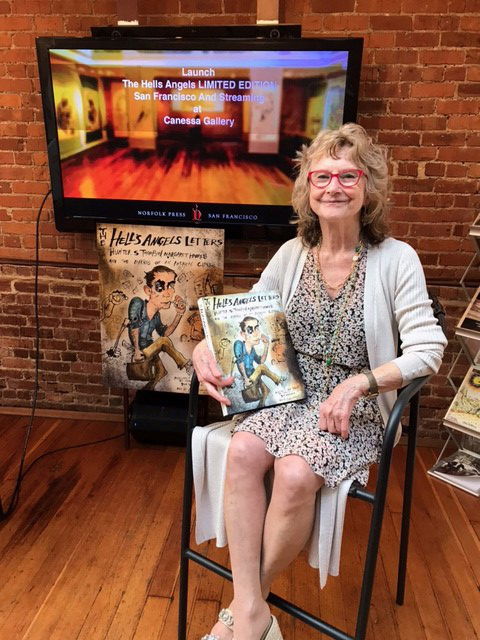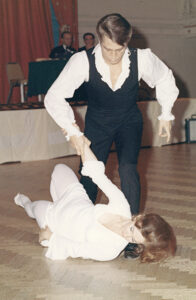
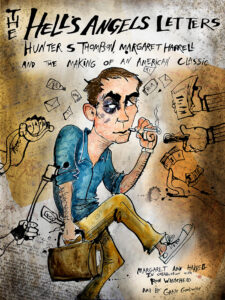
I’m glad to have the occasion to make these corrections now, while I’m alive. Earlier, I was correcting cemented errors in Hunter’s history. But now I realize there’s an opening for a brand-new 0ne.
I suppose it’s logical. That’s why I want to get ahead of it, before it sweeps the Gonzo world, as other rumors have.
The correction is that, contrary to logic, I am NOT in The Proud Highway, Hunter’s first book of letters. That’s right. It’s not me. Not in the Bal-Random combo, as Hunter put it. Not – repeat, NOT – responsible in any way for the initial comments in the margins of his manuscrip ov Hell’s Angels. All that preceded me. I had never heard of him, not up till August 1966!
There is in The Proud Highway a complete blackout from Hunter about the period in which I worked with him. For that you have to go to The Hell’s Angels Letters, where he profusely evokes his thoughts in the moment, slapdash or thought through, humorous or deeply touching.
When, May 24, 1966, he writes Bill Kennedy that “the Bal/Random combine [made] a few penciled comments in the margin,” that is NOT ME. I was busy with another book!!!
Bernard Shir-Cliff and Jim Silberman were the acquisition/developmental editors. My copy editing/line editing, came into play AFTER Hunter turned in the pristine revised manuscript to Jim, around the very end of July.
Receiving it, Jim passed it to me. As you see from The Proud Highway, Hunter did not expect this next step, evidently, because he keeps announcing the book’s impending publication.
The only place he speaks directly and at length about our work together (outside his letters to me) is in Fear and Loathing in America, Aug. 12, 1971, to Lynn Nesbit. He writes:
and he should assign someone to the book [his new book] who will prod me unmercifully, in the same way a copy editor named Margaret Harrell kept me locked to the daily grindstone on the Hell’s Angels book. That is, made sure he kept to the deadline.
Letter Oct. 4 (in The Proud Highway), an oblique reference to me: he has “the book’s finished first draft.” But that’s it. There is no mention of editing issues.
This is presumably just AFTER we began telephone communication, which gave him a sufficient outlet for expressing all his issues in a tight container of communication by phone and letter to me. No external venting.
So why doesn’t The Proud Highway contain samples of his letters to me that are in The Hell’s Angels Letters: Hunter S. Thompson, Margaret Harrell and the Making of an American Classic. Well, there you’ve got me. I’ve speculated he for some veiled reason no longer had copies! Or he may also have wanted, even then, to preserve my privacy. I opt for the first answer, but who knows? Someone will find out.
Nov 28 The Proud Highway. He’s working with me, using the telephone expense account. Has no verbalized complaints in letters even to his friends He now knows the accurate pub month, January.
The beauty and special value of The Hell’s Angels Letters is that it does not supplement The Proud Highway material but succeeds it – as The Next Step. It is Act Four if that was Act Three. New plot, new players, new scene.
In fact, the two books barely overlap and cover two distinct periods. It is as if someone, acting on my behalf, swept in and said, “No, no, no comment on that, no comment. Save it for Margaret.” Some custodian of who gets to cover what.
So THE HELL’S ANGELS LETTERS picks up AFTER Hunter turns the revised manuscript over to Jim by mail in July. At that point ONLY does Jim turn a pile of very clean, unmarked orange pages (his manuscript) over to me for copy editing.
Here, The Proud Highway goes silent. It’s Intermission time between Hunter’s two books of correspondence, and to entertain the audience during intermission we have The Hell’s Angels Letters, entirely different material.
Copy editing is very different from developmental editing, and Jim Silberman and Bernard Shir-Cliff were acquisition editors/developmental editing.
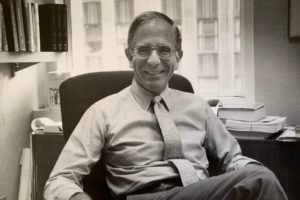
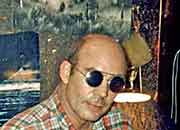
Especially in those days at Random House, when everything was done in house, copy editing carried a lot of responsibility: line editing, fact checking, proofing, suggesting in pencil (in brackets) paragraphs I thought needed tightening or transposing. Also, it necessitated psychology.
Imagine the sensitivity of a young author. You have to know how to reach him (him – it was all male authors I worked with then) so that he gets interested in changing even a word. Therefore, you have to show him an error he is grateful you pointed out. And another one, till he is pleading with you – slight exaggeration – to tell him what more you found. One author even pled with me to show him my secret notes on his entire book.
There was no badgering or haggling, but a seeing of eye to eye, at least in the way I was expected to handle things. After all, Jim said to me regarding Hunter, “Keep him happy.”
They wanted a New York Times best seller, which they got. They wanted to hang onto the author for future books. So his wish would be their command. It’s a very different story today, when sales are so heavily emphasized. Sales were important, but equally or more so a carefully crafted book. The editors were book lovers. They loved ideas and words.
With all of his work as acquisition/developmental editor, Jim had to delegate. He thanked the Universe that he felt safe when we worked as a team. I did too. He did not “read over my shoulders.” We made a plan, I copy edited, I then showed the copy edited manuscript to him, he OK’d it, I sent it to Hunter.
After that, Hunter worked DIRECTLY with me only. Lawyer objections, for instance, were funneled through me to him. Here, of course, he tried to raise bloody hell. But it had nothing to do with me personally. It was about legal interference. And I sided with him while also getting him to oblige the lawyers.
Hunter even had me writing Sonny Barger and Allen Ginsberg on his behalf. He made me his assistant, in effect, and RH did not mind as long as he was happy.
The Proud Highway is a marvelous source for the first stage.
The Hell’s Angels Letters are THE ONLY source for the copyediting stage and in that sense his relationship with me.
